FHSAA football metro/suburban split: How USA Today Florida Network reporters view potential change
The Florida High School Athletic Association will vote in February on a proposal to split the football member schools into four metro and five suburban/rural classifications.
The FHSAA's Athletic Director Advisory Committee voted 8-7 Wednesday against a motion not to endorse the proposal, which essentially serves as an endorsement of the metro/suburban split.
More: What FHSAA metro and suburban football classifications could look like in 2022
And: FHSAA athletic director committee essentially endorses metro/suburban classifications
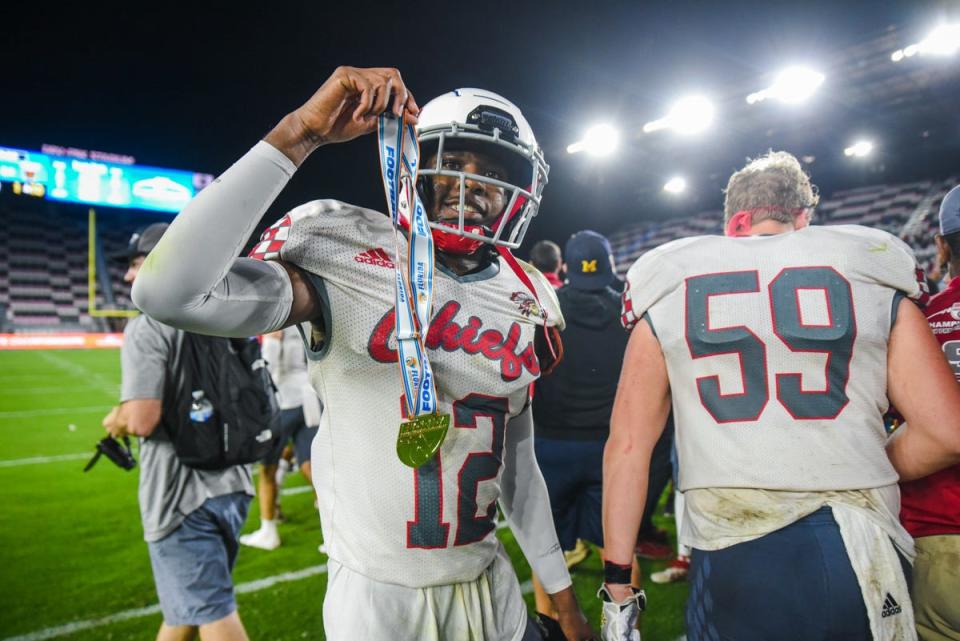
The four metro classifications would include schools from the eight most densely populated counties in the state: Duval, Seminole, Orange, Hillsborough, Pinellas, Palm Beach, Broward and Miami-Dade.
Those in favor of metro/suburban classes point to the metro's dominance in the state championships in the past decade as well as the increased attendance and excitement in Class 1A since its creation before the 2011 season.
In the past 10 years, metro-area schools have won 89% of the state football championships outside the 1A rural class.
Six of this year’s state champions – Jacksonville-Trinity Christian (Class 2A), Chaminade-Madonna (3A), Cardinal Gibbons (4A), Miami Central (5A), Jesuit (6A) and St. Thomas Aquinas (7A) – came from metro areas. The lone state champions from suburban areas were Madison County (1A) and Venice (Class 8A).
Those against the classification shift argue that it wouldn't be a true state championship if it doesn't include the whole state and also point at how many of the suburban districts would demand more travel and potentially end long-standing rivalries.
USA Today Florida Network asked its reporters to give their thoughts on the proposed metro/suburban classes.
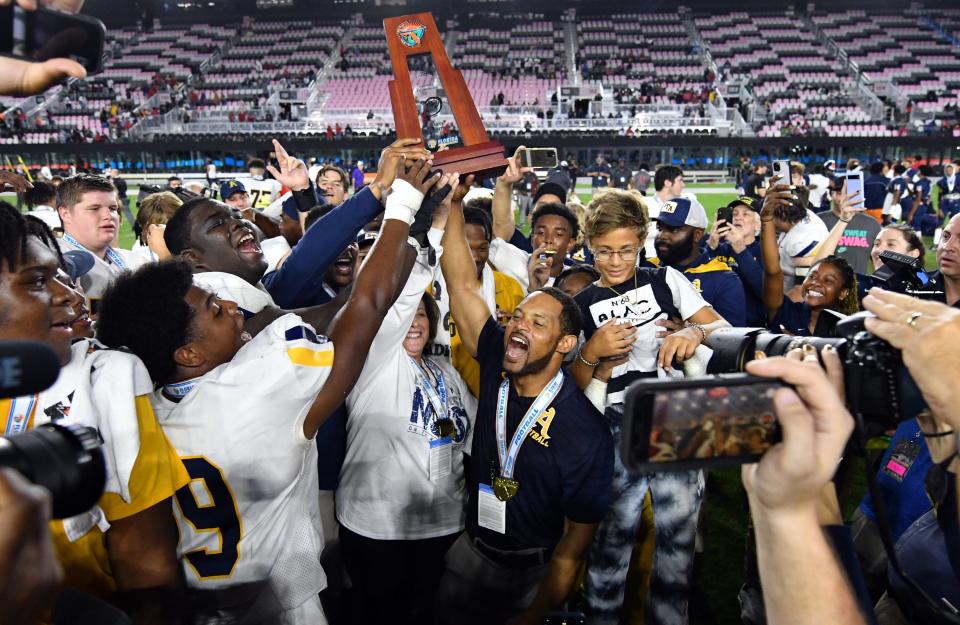
For
Jon Santucci, USA Today Florida Network
Bottom line, it's a competitive balance issue. Teams from suburban areas are not on equal footing with teams from metro areas. As I wrote in December, it's like looking at Disney and a county fair and saying, “Well they both have rides, so they’re the same.” It's ridiculous to think teams from small towns but have one larger high school should consistently compete with schools that are drawing from areas like South Florida. The metro/suburban split isn't a perfect change but it would provide a needed course correction.
Eric J. Wallace, The Palm Beach Post
I come down in favor of the change despite holding reservations.
My instinct is against any separation of classifications that might devalue the achievement of a state champion or render competition in half the state second-fiddle. While the statistical odds may be clear, "Cinderella" runs do still happen — Pensacola Pine Forest's near-upset of Tampa Jesuit in the Class 6A final this year a fine example.
But after six years covering high school football in Pensacola and with one down in South Florida, it's clear the metro/suburban split is a worthy experiment. The difference in resources between "suburban" Pensacola and "metro" Palm Beach is significant, the latter its own distance behind the on-field success of Broward and Miami-Dade County.
Pensacola High School won the city's last state championship in 2009 and Bratt Northview's 2012 Class 1A state title was the last by an Escambia County program.
The city went a full decade without a team reaching the state final until the 2019 Escambia Gators, who were the most complete team of my time in Pensacola and led by Mike Bennett, the city's last coach to win a state title, carried a 14-0 record into the Class 6A state final. Miami Central rolled the Gators 62-27.
The metro/suburban split would bring more of the state into the drama of December football in Florida.
Seth Stringer, Northwest Florida Daily News
Coming from a pocket of Florida that's all rural, I think the split is a long time coming.
It's been 27 years since a non-1A program from our coverage area (Okaloosa County, Walton County and east edge of Santa Rosa County) won a state title. Just this year, South Walton's best team ever, featuring Class 4A Player of the Year Kemper Hodges and a 10-2 finish, was embarrassed by metro Bolles 55-7 in the region finals.
The two previous years rural Niceville was bounced by metro Edgewater back-to-back, and in 2009 and 2013 the Eagles were outscored 97-53 by metro Dwyer in the title game.
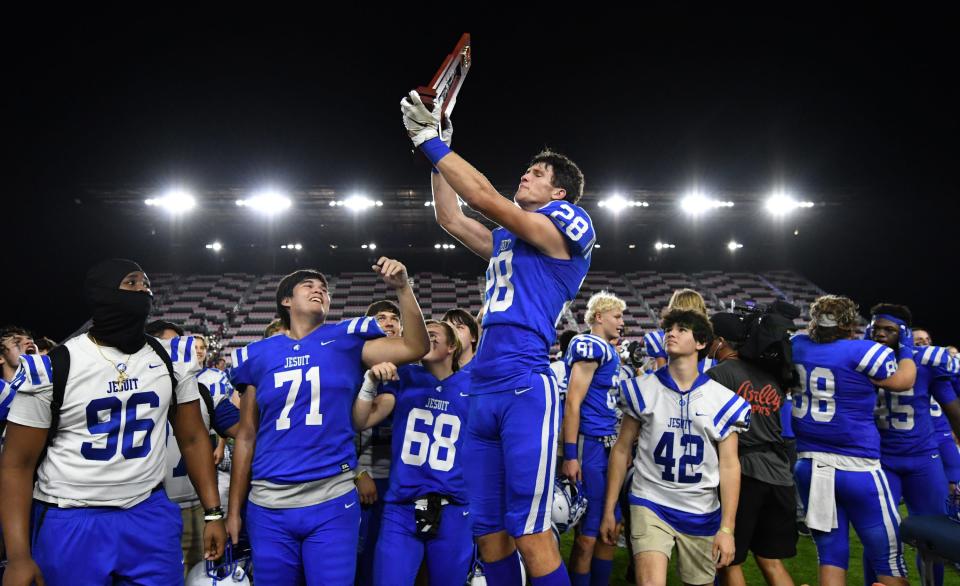
Jack Williams, Tallahassee Democrat
Out of all the cities and areas in the state, the Big Bend will most likely benefit the most from a metro vs. suburban system. More specifically, 2A and 3A schools will have a chance to really go deep in the playoffs now that they are separated from the Jacksonville and Miami schools.
Teams like Florida High and North Florida Christian, who end up running into the Jacksonville and Miami private powerhouses most years will have a bigger chance of competing in state title games. Through 5A and 6A, regionals will most likely be the same, but we may see more state champions out of Region 1. Rickards, Lincoln, Wakulla, and Godby could start racking up the state crowns.
With this new division, Tallahassee and the Big Bend could see the same success as schools from Miami as one of the largest areas in FHSAA suburban.
Ainslie Lee, The Gainesville Sun
I watched North Marion draw Cardinal Gibbons in the 2018 state championship game and fall 48-10 to the metro-area Chiefs, who have since added a pair of titles under to their resume.
In 2020, I watched Dunnellon advance to the Final Four, where they were knocked out by Rickards. But even had the Tigers advanced to the state championship game, it seems like it wouldn’t have mattered much considering Plantation American Heritage was waiting on the other side of the bracket. Ahead of 2020’s title game, the Patriots had won titles in 2013, 2014, 2016 and 2017.
Now covering the Gainesville market, I watched the Buchholz Bobcats play Cardinal Gibbons close, stun Jacksonville Bolles and string together an impressive season that was bound for a deep playoff run. But when you sit in the same classification as Florida’s giant, St. Thomas Aquinas, there’s a mutual understanding that the season won’t end with Buchholz earning a ring, despite being an extremely well-coached and talented ball club.
The parity between suburban and metro markets is real. And the proposed split would be one step in the right direction for a fair playing landscape.
Brian McCallum, FLORIDA TODAY
With the realization that the FHSAA has given up efforts to stop rampant transferring, this seems like a strong proposal to repair some of what has been damaged by that. It isn’t perfect, but it appears to be an improvement.
My top concern is that the FHSAA will either now, or eventually, try to water it down even more by adding more classifications. While it should be possible that any school could win a state championship, it shouldn’t be common. Keep the number of state champions where it is, at least.
John Patton, Ocala Star-Banner
I’m for this. The competitive balance issues in the state have not been fixed with time. Those arguing the current free-for-all recruiting eventually will even things out are incorrect, too. Where a local school like Ocala Vanguard may have a pool of 10,000 kids within 10-15 miles, a school in Miami might have 100,000 kids in the same distance to choose from. If you have one apple orchard with 10 trees and another with 100, you’ll probably get some really good apples in the smaller orchard, but you are more likely to get a lot of them in the bigger one. This is high school football in Florida. It’s time for a fairer apples-to-apples setup.
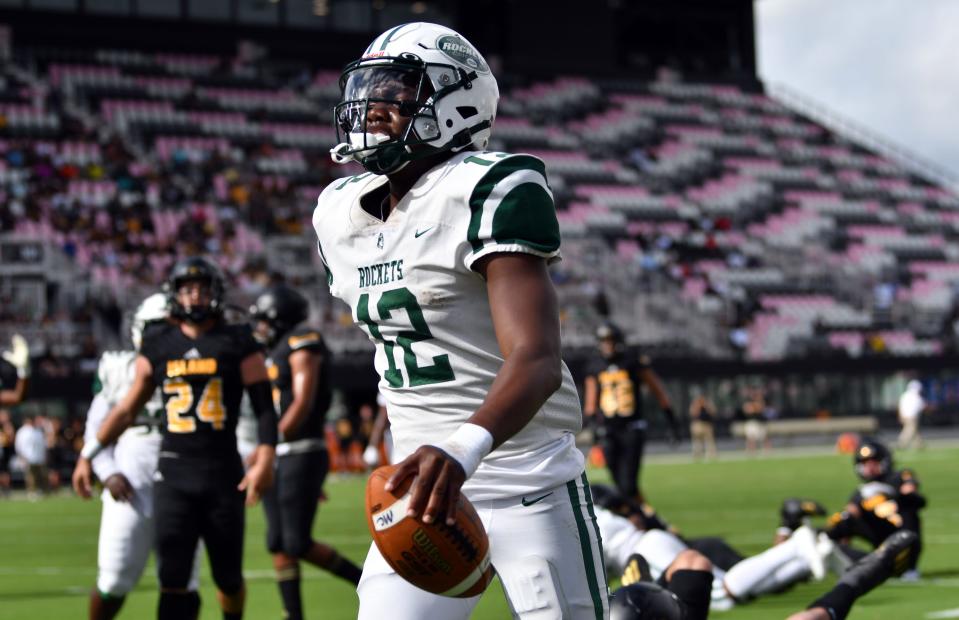
Against
Emilee Smarr, The Palm Beach Post
Do I agree that there needs to be a change in how the state is divided? Yes. Do I think that the metro and suburban reclassifications will be what renews Florida's excitement for state finals? Not necessarily.
I think this is a temporary remedy that will ultimately reveal what we already knew – the biggest reason for the imbalance is public schools and private schools playing by different rulebooks. This might come as a shock, but you're probably going to see the same teams in state finals every year when they're essentially allowed to recruit athletes with no repercussions. Not only metro schools, but private schools have combined to dominate the 2A-6A classes, winning 53 of the 55 possible championships since 2011. Even if schools are reclassified as "metro" or "suburban," private schools like St. Thomas Aquinas, Cardinal Gibbons, and Chaminade-Madonna will continue to compete as "metro" schools and – you guessed it – state finalists.
Nonetheless, I hope that should this proposal be put into action, it will expose the greater underlying issue and Florida high school football won't bear as much semblance to the College Football Playoff.
Alex Martin, News-Press Media Group
The Instagram comments say it all on our recent post discussing this matter.
“That’s lame dawg, good thing I’m done with high school football.”
“That’s not a STATE championship then….”
“Embarrassing!! Basically, saying the only way to win a state title is to remove Tampa, Miami, Orlando. Because we cannot beat them.”
“This is lame. Being an athlete in Lee County, playing against those cities made me a better athlete. They have so much talent, you’re holding kids back from getting better and making them settle for being “mediocre” instead of competing.”
It’s evident kids are not in favor of this. They welcome the challenge against Miami-Dade every year in the playoffs, despite winning well under 30% of the time. They know the state runs through South Florida and has been that way for the past decade. That’s why they put in months of work, some of which they don’t necessarily have to put in during the offseason.
The proof? Naples High. After getting blown out year-after-year with head coach Bill Kramer at the helm in the playoffs, Rick Martin’s split back offense had a Miami Central team littered with four- and five-star recruits everywhere, to have them on the ropes in the fourth quarter, before losing 31-21 on a pick-six with just under four minutes left.
The Golden Eagles put up 35 points on Northwestern last year and were going back-and-forth with the Bulls before falling by two touchdowns. In Kramer’s final five playoff games against South Florida teams, the average loss margin was 27.2 points. Under Martin, it’s dropped by two scores, down to 12 points. Take a few plays from the Northwestern game last year, and the Bulls would’ve been eliminated in the regional semifinals. Mind you, that was a game Naples played without lockdown corner Devin Moore, who is now at Florida.
Will kids move into metros because they don’t believe their recruiting will get enough attention by playing against a second-tier group in Florida? What will happen with participation, especially with it going down over recent years per the NFHS knowing you’re not a true state champion if you live in a suburban area?
There’s too many potential flaws here that I don’t believe the committees have considered.
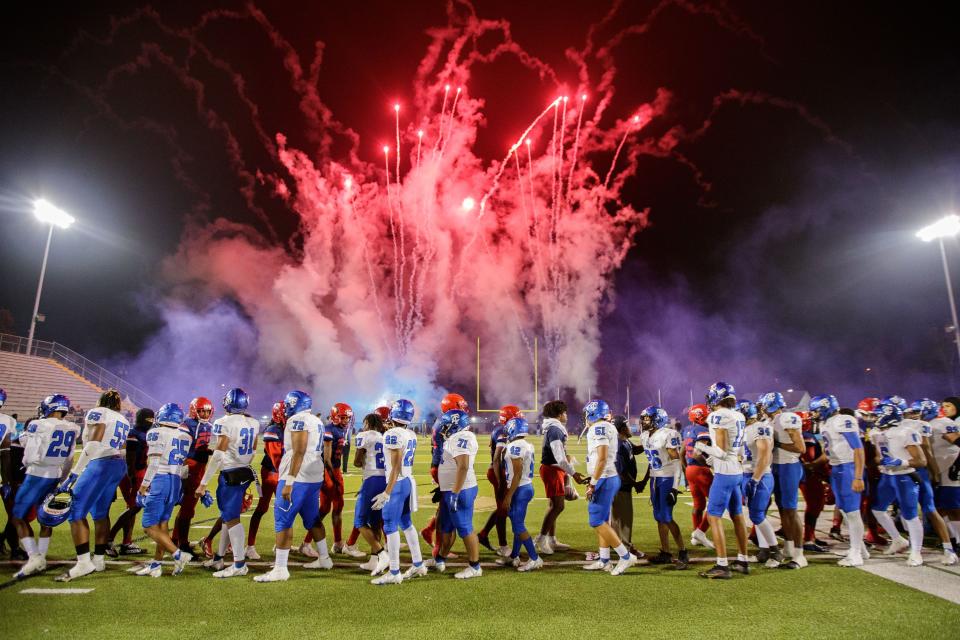
Unsure
Bryan Cooney, TCPalm
In the spirit of this proposal, I would see many rivalries still being maintained and very strong competition take place no matter where the road to a state title would go through for urban and suburban areas. I’m just not sure if the satisfaction for teams would feel the same knowing that seeing how you’d stack up against the best of the best would be taken out of their hands. While goals for all football programs in Florida are going to differ based on reality, playing the best provides opportunities for personal growth, recruiting and prestige and a lot of that could be taken away. Offering the best experience to kids whether it results in winning or losing should be what is desired and for suburban areas that make up so much of this state, how much of the experience is impacted compared to the urban areas that already have it made pretty well could be a great disadvantage in the long run.
Clayton Freeman, Florida Times-Union
First, the positives: After a decade of big-city dominance (schools from the eight Metro counties have won nearly 90% of FHSAA football titles outside Class 1A since 2011), a Metro-Suburban split seems likely to improve competitive balance within classes, freshen up the postseason competition and give more schools genuine championship hope. Since 2012, the existing playoff system has seen more championship games ending in blowouts by 25 points or more (24 times) than decided by a single score (21 times), while a handful of Metro schools have built mega-dynasties: seven titles each for Miami Central and St. Thomas Aquinas since 2012, six for Jacksonville Trinity Christian, five apiece for Miami Booker T. Washington and Plantation American Heritage, four each for Chaminade-Madonna, Champagnat and Madison County. What's not so clear: the long-term consequences. Will a split worsen scheduling or travel challenges for schools? Could it risk relegating champions in the Suburban classes to the status of "best of the rest" in public perception? Will it create some districts that are essentially frozen solid by geography for the foreseeable future, growing stale after a couple of cycles? How does a split affect schools in Suburban counties that border a Metro area, like the Keys or Nassau County along the Georgia border north of Jacksonville? Will some schools opt to ditch the new system for the independent route — an issue that helped prompt the FHSAA to revise its playoff structure five years ago? Those are among the questions still unknown, and how the FHSAA manages those issues — if the plan even passes the board of directors next month — will determine whether the Metro-Suburban plan sticks around or whether the association finds itself going back to the drawing board in a couple of years.
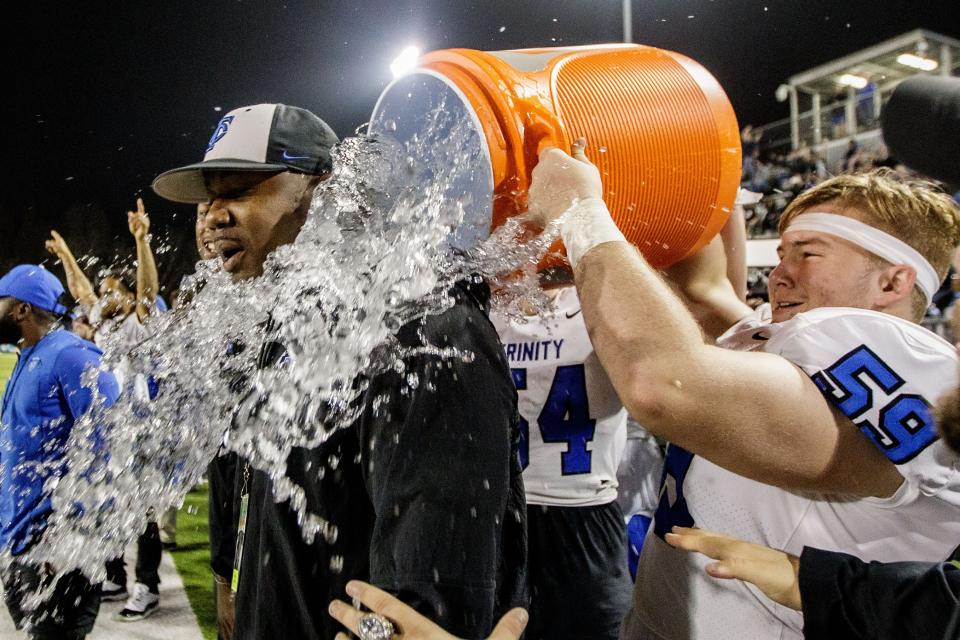
Dennis Maffezzoli, Sarasota Herald-Tribune
I'm all for change, but this looks like a big one. I'm willing to give it a cycle or two, either two or four years to see how it works out. If the projected classifications are accurate, most of the rivalries in the Suncoast area will remain the same. And it will force some of the schools to renew rivalries with schools they have played in the past. More schools may take the independent route and shorten some of the district if they do not like where they are placed. I'll give it a cycle or two to see how it works out and then make a more definitive opinion.
Chris Boyle, Daytona Beach News-Journal and St. Augustine Record
On the whole, reorganization is needed for the sake of competitive balance. I think that's a concept most people in and around high school football can agree with. However, there are some logistical challenges with this particular proposal. There are some massive geographical gaps to bridge, particularly in the upper classifications of the Metro group. Jacksonville's three largest schools are either stuck on an island in their own district or oddly grouped with Seminole County programs roughly two hours southwest for district games. And it is worth wondering if the suburban championships will feel "watered down" considering the absence of the normal heavy hitters — St. Thomas Aquinas, Miami Central, Plantation American Heritage, Bolles, Jacksonville Trinity Christian, etc. Student population, clearly, should not be the only metric used to classify schools. I'm just not sure this is quite the solution to the long-standing equity issue.
This article originally appeared on Palm Beach Post: FHSAA metro/suburban football split: USA Today Network writers share views

